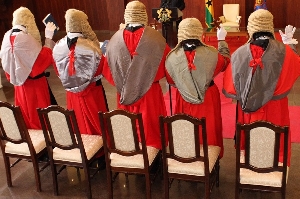- (PART 2)
In the first part of this write-up (which appeared on GhanaWeb on Tue 18 July 2006), I concluded that, the breakthrough of every one of us is now. A consequence of this is that we must live in the present in order to live our lives and to the full. Since we form part of a larger society in a constant evolution, we must equally constantly read the signs of the times we live in, by re-examining our situation for improvement. Else we become static and remain in the past. In this regard I want to commend the wonderful comments made by “contributors” to the first part.
Now, how can one’s belief in the concept “breakthrough” lead one to achieve greater things in life? To be able to achieve a thing in life requires belief in one’s capabilities. It could serve as the proverbial placebo effect, where the individual believes and expects that a particular prescription/recommendation would work. Or, is this an opiate? This is in contrast to the nocebo effect where the individual refuses to admit or believe that a particular prescription/recommendation would work.
Much of the time, individuals only apply negative thoughts and wishes to their progress in life. Unconsciously they project their negative state of mind onto other people. The power of the individual’s mind and the human person is the reason persons are able to create powerful gods or “powers”. If only we could rather transmit this energy into our own dreams, we can achieve whatever breakthrough we require in life.
Our wishes could become the proverbial horses and we could ride. If parents keep telling their children: you are great, you are the best, you are the “coolest” child in the whole world; these children could become great. Unfortunately Ghanaians are generally not used to praising their children or even people who are successful in life. A child comes home from boarding school and her report card arrives during the holidays. The father calls her and instead of first praising her to the skies for the excellent grades in Core Science or CRS or Management in Living, he starts using abusive words to describe her poor grades in Core Mathematics.
Generally Ghanaians have so much internalised the injunction: “Do not sing your praises, let others rather praise you”, and so we refuse even to accept praise and or give praise to other people. (This injunction is found in our traditional proverbs and in a subtle form in Matthew 6:1ff— When you give alms do not blow a horn before you… looking for applause….; do not let your left hand know what your right hand is doing…). Some husbands hardly say a word of appreciation to their wives. A wife may sacrifice herself just to make the husband feel at home. But at table instead of praising the wife and the children for a good meal, the first word is: why is the food so salty today? Or a man may go shopping and dream of the best gift for her wife, he comes home with the gift, hoping to surprise his wife, the wife takes the gift and starts complaining about the price or something else. The breakthrough of a perfect marriage life could elude such partners.
The key to a breakthrough in life is the individual herself/himself. No amount of prayers or fasting can ensure our breakthrough until we make the first effort. Be positive about life but at the same time give room for the negative events in life to make a balance. Pursue your breakthrough, but live in the present to do so. Maybe a word of support to those who believe in God or in prayers: Pray hard as though all depends on God but equally work hard as though all depends on you.
Thank you to the great creators of GhanaWeb and to you wonderful readers.
If you have the time to spare, kindly try the following: 1. Look at the comments section (elsewhere or of previous days) and look out for how many commentators project their negative view of life into what they write.
2. Can one achieve her/his breakthrough without reference to a God or deity?















